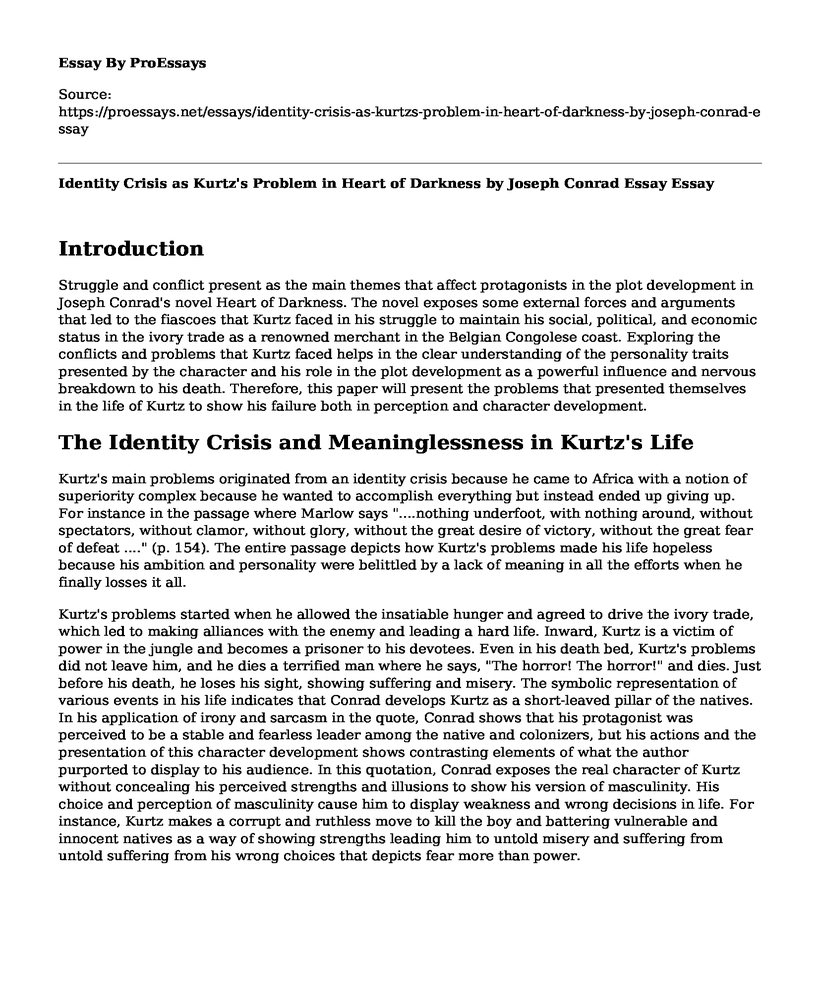Introduction
Struggle and conflict present as the main themes that affect protagonists in the plot development in Joseph Conrad's novel Heart of Darkness. The novel exposes some external forces and arguments that led to the fiascoes that Kurtz faced in his struggle to maintain his social, political, and economic status in the ivory trade as a renowned merchant in the Belgian Congolese coast. Exploring the conflicts and problems that Kurtz faced helps in the clear understanding of the personality traits presented by the character and his role in the plot development as a powerful influence and nervous breakdown to his death. Therefore, this paper will present the problems that presented themselves in the life of Kurtz to show his failure both in perception and character development.
The Identity Crisis and Meaninglessness in Kurtz's Life
Kurtz's main problems originated from an identity crisis because he came to Africa with a notion of superiority complex because he wanted to accomplish everything but instead ended up giving up. For instance in the passage where Marlow says "....nothing underfoot, with nothing around, without spectators, without clamor, without glory, without the great desire of victory, without the great fear of defeat ...." (p. 154). The entire passage depicts how Kurtz's problems made his life hopeless because his ambition and personality were belittled by a lack of meaning in all the efforts when he finally losses it all.
Kurtz's problems started when he allowed the insatiable hunger and agreed to drive the ivory trade, which led to making alliances with the enemy and leading a hard life. Inward, Kurtz is a victim of power in the jungle and becomes a prisoner to his devotees. Even in his death bed, Kurtz's problems did not leave him, and he dies a terrified man where he says, "The horror! The horror!" and dies. Just before his death, he loses his sight, showing suffering and misery. The symbolic representation of various events in his life indicates that Conrad develops Kurtz as a short-leaved pillar of the natives. In his application of irony and sarcasm in the quote, Conrad shows that his protagonist was perceived to be a stable and fearless leader among the native and colonizers, but his actions and the presentation of this character development shows contrasting elements of what the author purported to display to his audience. In this quotation, Conrad exposes the real character of Kurtz without concealing his perceived strengths and illusions to show his version of masculinity. His choice and perception of masculinity cause him to display weakness and wrong decisions in life. For instance, Kurtz makes a corrupt and ruthless move to kill the boy and battering vulnerable and innocent natives as a way of showing strengths leading him to untold misery and suffering from untold suffering from his wrong choices that depicts fear more than power.
Conclusion
Conclusively, the precarious state of the protagonist is compromised by his self-perceived features of masculinity and superiority pretending as one without fear but comes out as very fearful in everything he did. Kurtz puts so much effort to paint his image depicting ironic, and sarcasm in the display of racism, colonialism, and masculinity, which instead portrays the metaphor of fear and insecurity. In the literal application, the idea of concern in the quote helps to depict the contrast of reality and perception of human's self-actualization in character development of the protagonist in the novel.
Cite this page
Identity Crisis as Kurtz's Problem in Heart of Darkness by Joseph Conrad Essay. (2022, Dec 08). Retrieved from https://proessays.net/essays/identity-crisis-as-kurtzs-problem-in-heart-of-darkness-by-joseph-conrad-essay
If you are the original author of this essay and no longer wish to have it published on the ProEssays website, please click below to request its removal:
- The Overall Synopsis of the Book
- Hercules Essay Example
- Epic Poems Essay Example
- Literary Analysis Essay on "Voices of the Self"
- Literature Analysis Essay on Dubliners The Dead
- Structural Analysis of Hamlet: Critical Essay
- Essay on Beloved: A Story of Black Struggles and Triumph in Pre-Civil War America







